Frozen shoulder, also known as adhesive capsulitis, is a painful condition that causes stiffness and restricted movement in the shoulder joint. It often develops gradually and can significantly impact your daily activities. At Fit2Function Clinic in Oxford Circus and Covent Garden, we specialise in diagnosing and treating frozen shoulder using Physiotherapy, laser therapy, shockwave therapy, ems therapy, infrared cupping, manual therapy and guided exercise rehabilitation to restore movement and reduce pain at every stage of the condition.
How Can We Help Treat Frozen Shoulder
Frozen shoulder can make everyday tasks like reaching, dressing or lifting extremely difficult. However, with the right care, most people make a full recovery and regain full shoulder movement.
At Fit2Function Clinics, we specialise in treating shoulder conditions using a combination of hands-on physiotherapy, exercise rehabilitation and advanced treatments such as Shockwave and Laser Therapy. Our approach focuses on improving joint mobility, reducing pain and restoring normal function as quickly as possible.
What you can expect:
- Detailed assessment to identify the stage and severity of your frozen shoulder
- Gentle mobilisation and manual therapy to increase movement
- Advanced treatments to accelerate tissue recovery
- Tailored home exercise program to maintain flexibility
- Guidance on posture, activity and lifestyle to support long-term improvement
We help you progress step by step, from easing pain to restoring full, confident movement.
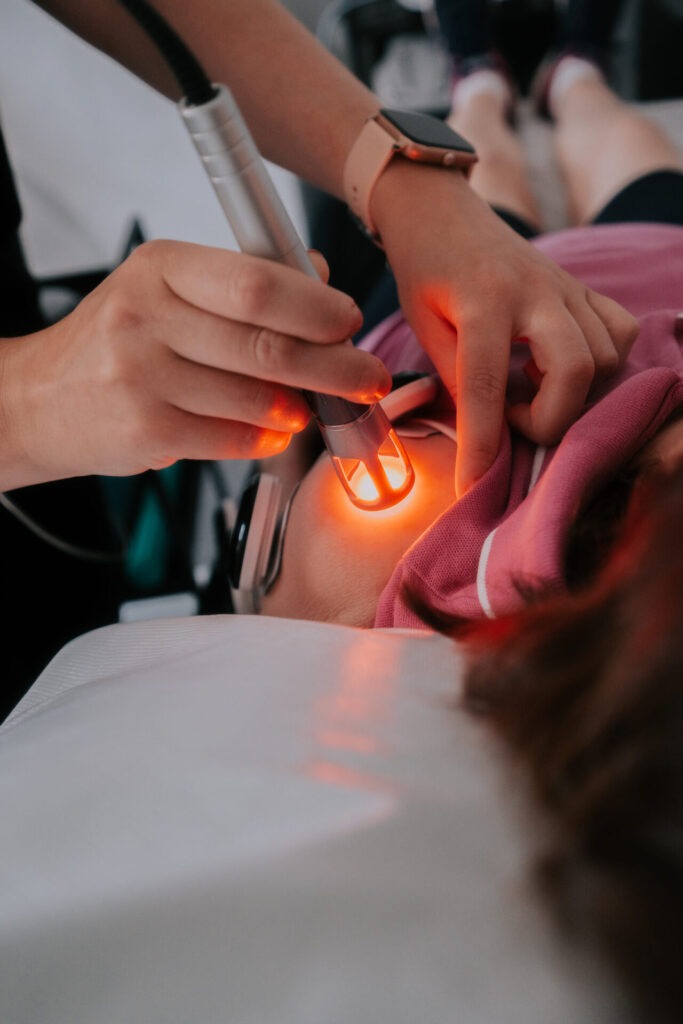
What is Frozen Shoulder?
Frozen shoulder is a condition where the shoulder joint capsule becomes thickened and inflamed, leading to pain, stiffness and restricted movement. The exact cause isn’t always clear, but it often occurs after injury, surgery or periods of immobility. People aged 40-60 are most commonly affected and it’s more prevalent in women and those with diabetes or thyroid conditions. At Fit2Function Oxford Circus and Covent Garden, we help clients identify the stage of frozen shoulder they’re in and create a personalised treatment plan to regain shoulder function and reduce pain over time.
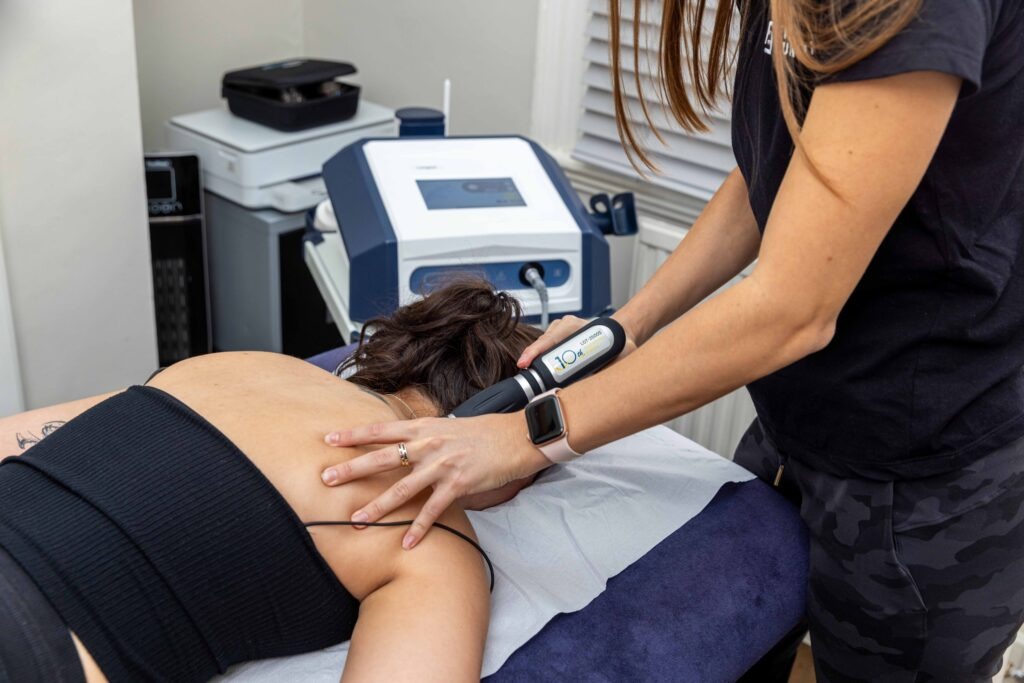
What are the Common Symptoms of Frozen Shoulder?
Frozen shoulder symptoms usually start gradually and worsen over time. Early on, clients may experience a deep aching pain in the shoulder, especially at night or when lying on the affected side. As the condition progresses, stiffness increases and basic movements like reaching overhead, putting on clothes or brushing hair become difficult. The shoulder may feel locked or “stuck,” with a noticeable loss of active and passive range of motion. At our Oxford Circus and Covent Garden clinic, we assess the severity and stage of your frozen shoulder so we can deliver the most effective treatment for your specific needs.
What are the Common Causes of Frozen Shoulder?
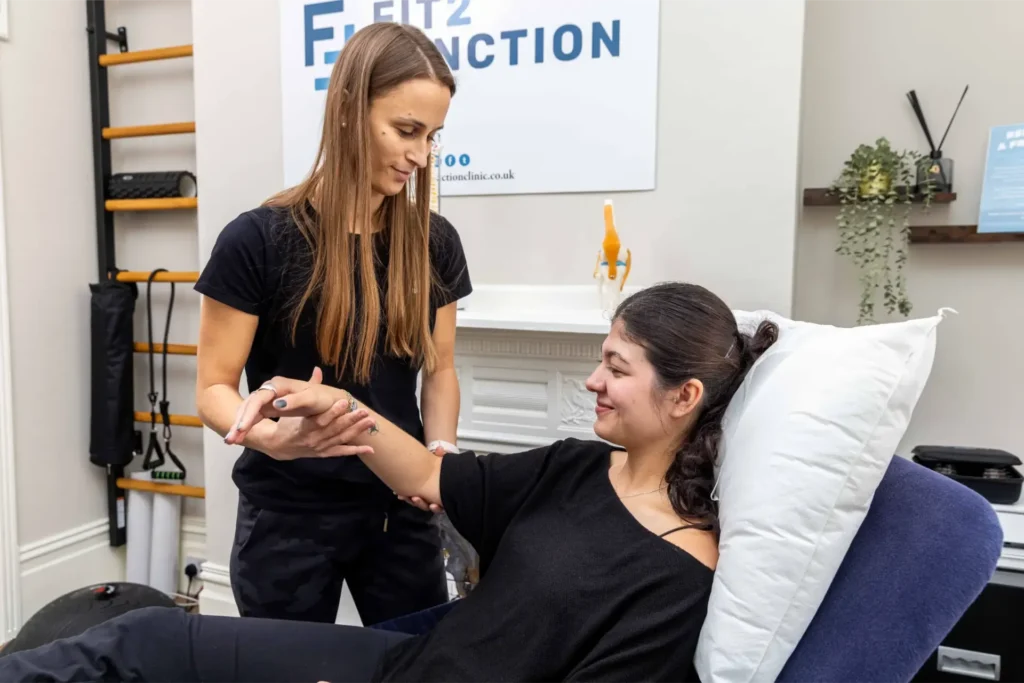
What Makes Us Different
Since 2017, Fit2Function has helped thousands of people across London recover from shoulder injuries and regain full function.
We’re one of the few clinics that combine traditional physiotherapy with advanced recovery technology, offering measurable results and a 90% success rate within six sessions. With over 350 five-star reviews on Google and Doctify, our reputation for effective, results-driven care speaks for itself.
Here’s why patients choose us:
- Specialist physiotherapists with advanced clinical training in shoulder rehabilitation
- Longer 60-minute sessions for detailed treatment and advice
- Proven success rate and outstanding client satisfaction
- Modern facilities in central London – Oxford Circus and Covent Garden
- Supportive, friendly environment focused on your recovery goals
We don’t rush your recovery, we personalise it to ensure the best possible outcome.
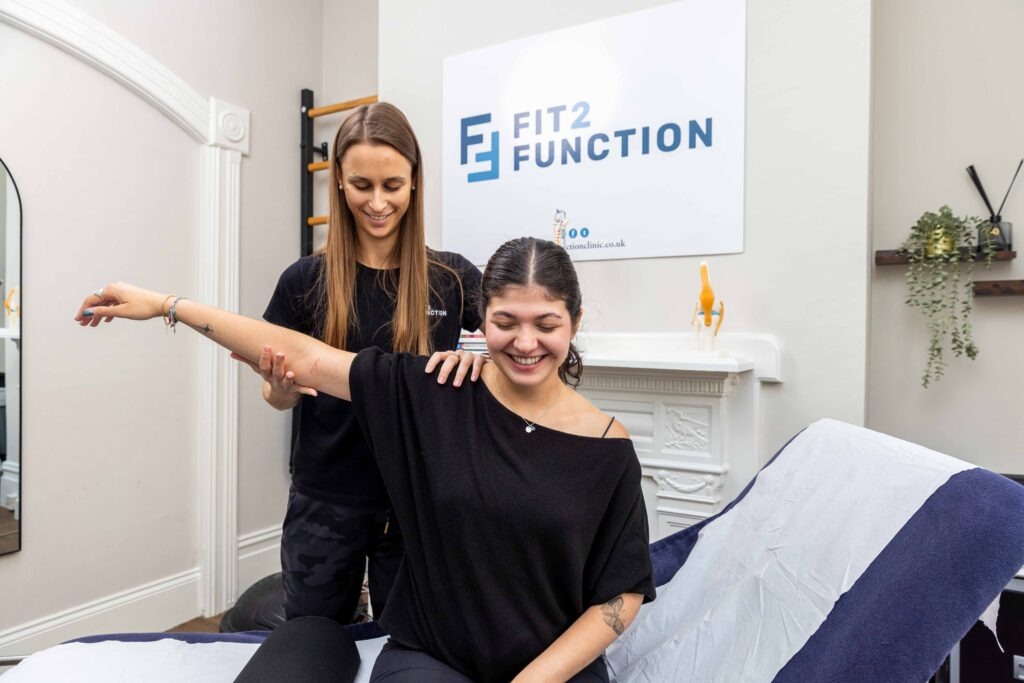
Benefits Of Frozen Shoulder Treatment
With early and consistent treatment, frozen shoulder can be managed effectively and full recovery is achievable in most cases. Benefits of having treatment include reduced pain, improved joint mobility, restored shoulder function and a faster return to everyday activities. You’ll regain the ability to lift, reach, and rotate your shoulder comfortably, improving your independence and quality of life. Our team at Fit2Function Oxford Circus and Covent Garden helps clients navigate each phase of recovery, avoiding unnecessary delays and preventing long-term stiffness. We also focus on educating you about posture, strength and joint protection to reduce the likelihood of injury recurrence in the future.
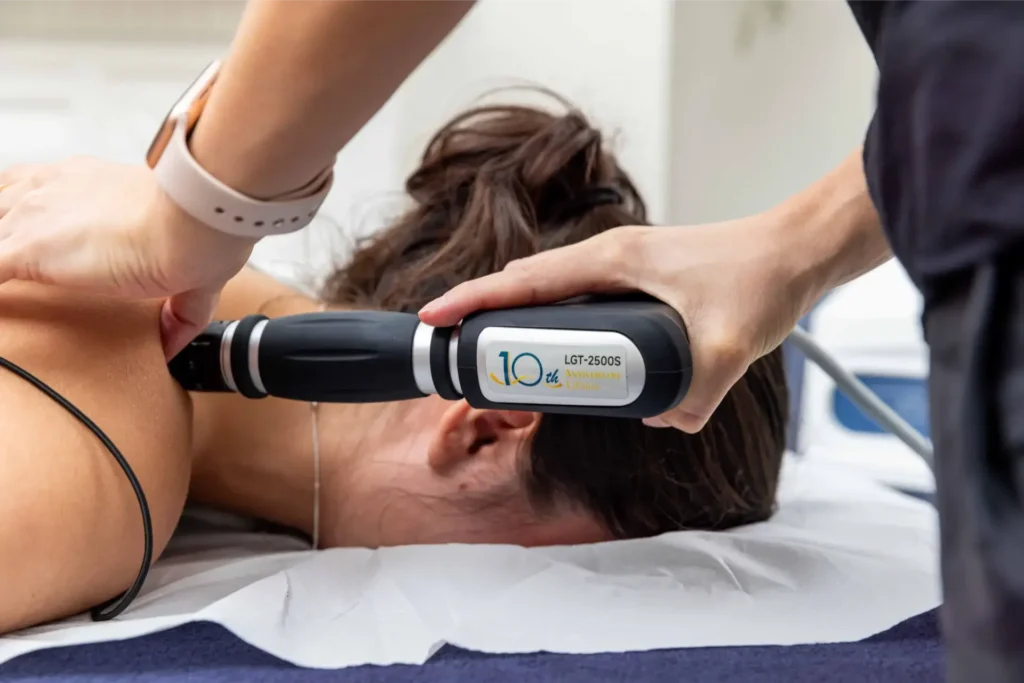
What To Expect On Your First Visit
When you book your first appointment, here’s what you can expect:
- Comprehensive Consultation: We’ll discuss your pain, history and how it’s affecting your daily life.
- Detailed Assessment: We’ll check shoulder movement, strength and joint function to identify your recovery stage.
- Diagnosis & Explanation: You’ll learn exactly what’s happening and what we can do to help.
- Your First Treatment: We normally start treatment during your first visit to begin restoring movement immediately.
- Tailored Recovery Plan: You’ll receive a personalised exercise plan and advice for maintaining progress at home.
We make sure you leave feeling reassured, informed and confident about your recovery plan.
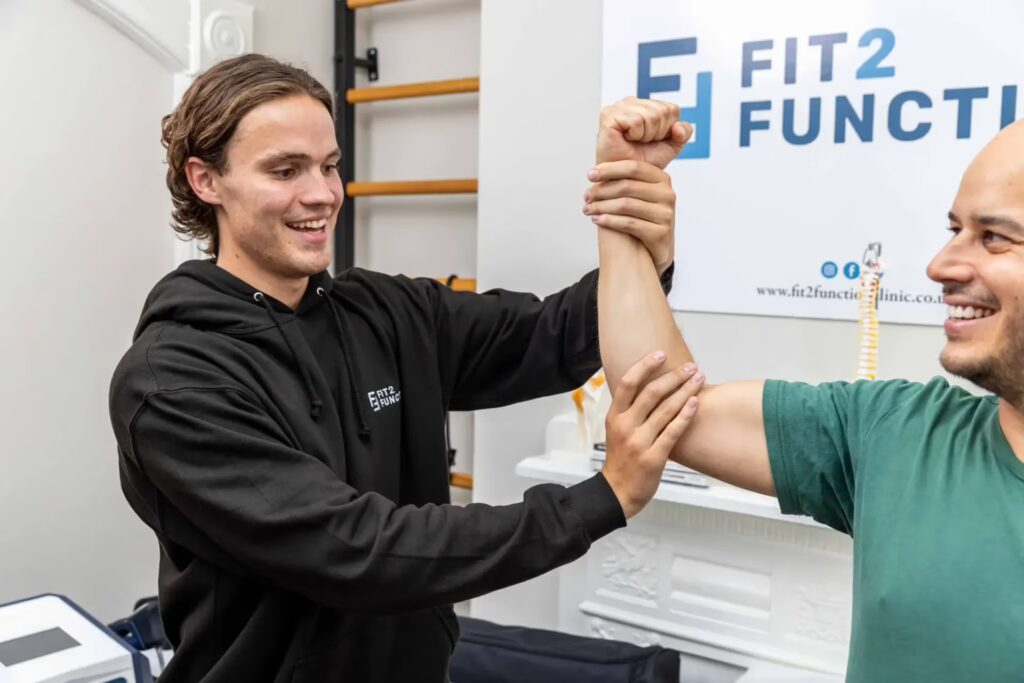
How To Book Your First Appointment:
Getting started is simple:
- Click the “Book An Appointment” button on this page.
- Select your preferred practitioner, service and time.
- Attend your first session and begin your recovery journey.
Prefer to chat first? Call us at 02071172076 or fill out the contact form at the bottom of the page and we’ll happily guide you through the process.
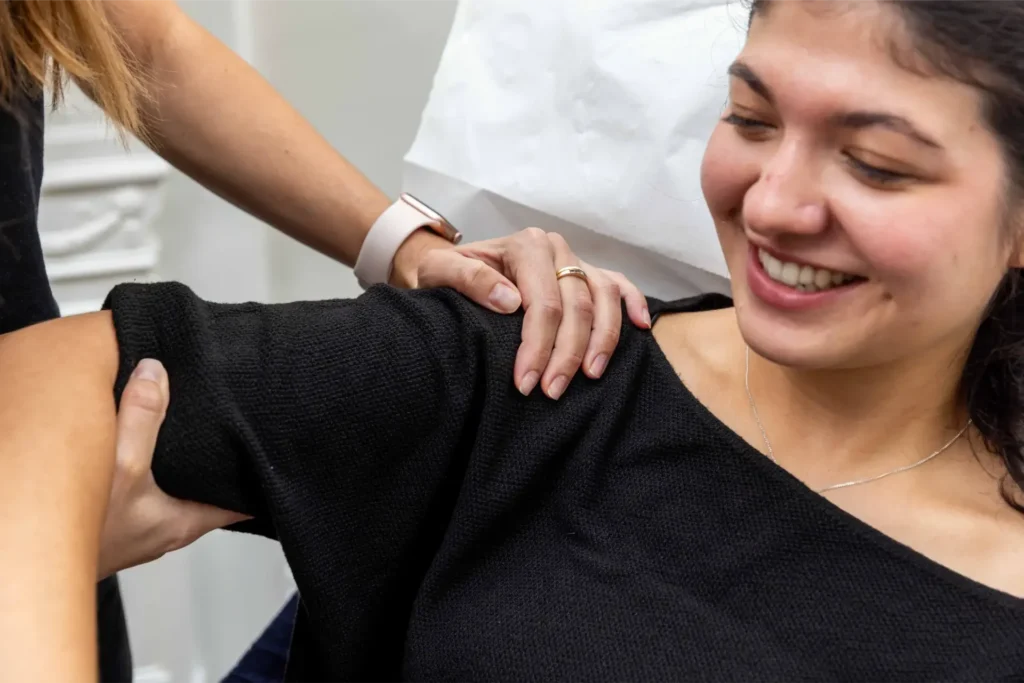
EXCELLENTTrustindex verifies that the original source of the review is Google. Very good laser treatment for lower back pain. Relieve a lot after the session.Posted onTrustindex verifies that the original source of the review is Google. Really impressed with George on my visit to F2F. Ankle has felt weak for a while now post sprain but already feeling better post treatmentPosted onTrustindex verifies that the original source of the review is Google. 5 stars is not enough for Anna! She is amazing.. not inky has she healed my shoulder she also healed my sons football injury! He is back playing in only a few weeks. ANNA also gave a plan which he can do along side his training to keep him fit! She is worth her weight in Gold!Posted onTrustindex verifies that the original source of the review is Google. I’ve been working with George at Fit to Function on and off over the past year, and I can’t recommend him enough. I was dealing with stubborn bicep tendinitis that just wouldn’t go away, but George completely sorted me out. Super friendly, knowledgeable, and genuinely helpful. I also love the new location — clean, professional, and easy to get to. If you’re struggling with any tendon issues, I highly recommend trying shockwave therapy here. It made a huge difference for me!Posted onTrustindex verifies that the original source of the review is Google. I’ve had some neck pain for a while, same with my right toe and thumb joint from football injuries. George and Conor were very welcoming. George really helped me in understanding the cause and telling me the right treatment before administering it. Completely recommend!Posted onTrustindex verifies that the original source of the review is Google. OMG amazing clinic, solved my issues and can run again. Thank you for your professionalism and attentiveness and such a warm atmosphere.Posted onTrustindex verifies that the original source of the review is Google. I went to Fit2Function for my ankle and had Anna Jancsurák as my Physiotherapist. She was amazing and so thoughtful and kind and very helpful in my rehabilitation. She explained everything very thoroughly and is very knowledgeable and showed me very helpful excersicesPosted onTrustindex verifies that the original source of the review is Google. I am currently being treated by Anna at Fit2Function for recurring knee issues. Anna is a fantastic physiotherapist: knowledgeable, professional, thorough and exceptional at her job. After only 3/6 sessions, and keeping up with physio outside of official appointments (don't skip this step), my legs are stronger and my knees no longer ache throughout my long, active workdays. I cannot recommend Anna enough, and I am safe in the knowledge that, should I ever have any body-related issues, I will be in safe hands with her.
Frozen Shoulder FAQs
How long does it typically take to recover from frozen shoulder with treatment?
Recovery can take several months, depending on the stage and severity. With consistent treatment, many people see noticeable improvement within 3-6 weeks and full recovery typically occurs within 3-6 months.
Can frozen shoulder recur after successful treatment?
It’s uncommon for frozen shoulder to recur in the same shoulder, but it can sometimes develop in the opposite shoulder, especially in people with underlying risk factors such as diabetes or autoimmune conditions.
How do you differentiate frozen shoulder from other shoulder injuries?
We assess your range of motion, symptom history and perform specific clinical tests. Frozen shoulder causes both active and passive stiffness, whereas other injuries often allow passive movement even if painful.
Can frozen shoulder affect both shoulders at the same time?
It typically affects one shoulder at a time, but in rare cases, particularly in people with systemic health conditions both shoulders can be affected sequentially or even simultaneously.
Can frozen shoulder cause permanent damage if left untreated?
In most cases, frozen shoulder resolves over time, but without treatment, recovery may take longer and full range of motion may not return. Early intervention helps prevent long-term stiffness and shoulder joint dysfunction.